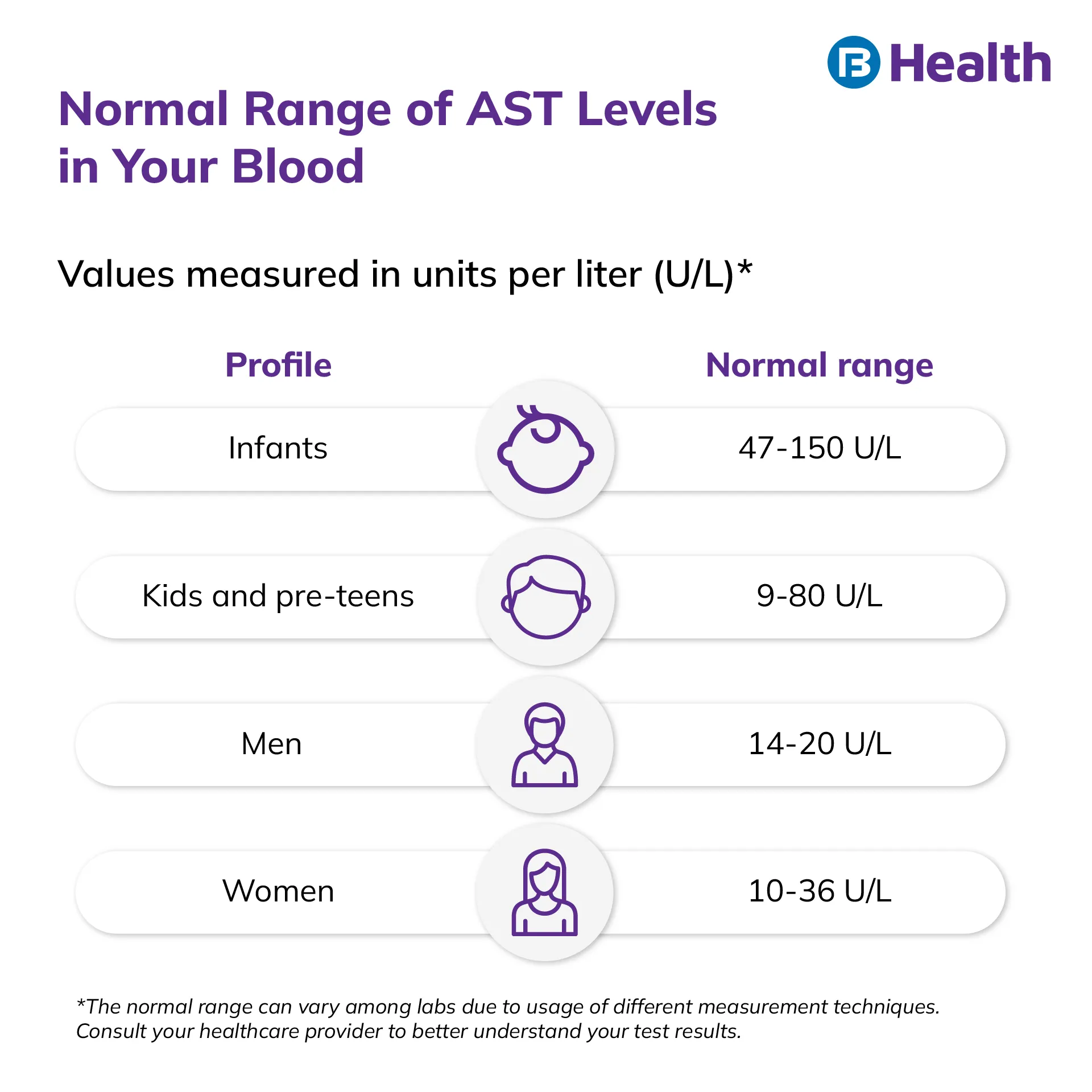General Health | 5 min read
Aspartate Aminotransferase Blood Testing: Procedures and Normal Range
Medically reviewed by
Table of Content
Synopsis
Aspartate aminotransferase testing is essential to check liver health as this is an enzyme largely made by your liver. If you see aspartate aminotransferase high in blood test results, visit a doctor.
Key Takeaways
- Aspartate aminotransferase (AST) is an enzyme made by liver and other organs
- Aspartate aminotransferase testing helps to identify liver conditions
- Aspartate aminotransferase lab test may also help determine related disorders
With aspartate aminotransferase testing or the aspartate aminotransferase lab test, doctors determine whether you have a liver condition or are at risk of developing one. Doctors may also order this test in case you already have liver disease and check the status of the condition by comparing the results.
Aspartate aminotransferase (AST) is an enzyme prepared by your liver in a large amount and other organs like the kidney, heart, and brain in comparatively smaller amounts. Apart from that, the enzyme is also present in your muscles and red blood cells. In case of any damage to these organs, cells, or muscles, AST levels can shoot up there as the enzyme may remain highly active for up to 6 hours [1]. The aspartate aminotransferase lab test determines the exact amount of AST enzyme released by injured cells or tissues in your blood.
Read on to learn about the principle of the aspartate aminotransferase test and the other factors related to it.
Why undergo aspartate aminotransferase testing?
Usually, doctors recommend the aspartate aminotransferase lab test to find out whether you have hepatitis or any other liver disorder. In most cases, aspartate aminotransferase testing is done along with alanine aminotransferase (ALT) testing. Doctors check the AST-to-ALT ratio to make the diagnosis. Note that they may ask you to opt for an AST rest in the following cases.
If you are experiencing the signs of liver disorder
The symptoms of liver disease may include nausea and vomiting, fatigue, stomach ache, loss of appetite, dark urine, bleeding disorders, jaundice, swelling of the abdomen, and itching in the skin.

If you are at high risk for liver conditions
Doctors may order aspartate aminotransferase testing in case of factors like genetics, obesity, exposure to hepatitis viruses, diabetes, alcoholism, and substance abuse. All these can severely affect your liver.
Apart from the above, doctors may also order an aspartate aminotransferase lab test in order to check the status of an existing liver condition that you may have. This test can also help check whether any medication is affecting your liver. Moreover, it can indicate whether you have any other medical condition that shoots up AST levels.
Remember, having any of the following conditions may increase your AST levels:
- Blood cancers such as lymphoma and leukemia
- Gallbladder disorder
- Amyloidosis, or abnormal protein accumulation
- Heat stroke
- Pancreatitis
- Mononucleosis or related infections caused by the herpes virus
- Hemochromatosis is a condition related to too much iron in your body
How to prepare for the test?
Unlike many of the other blood tests, you do not need to fast or stop certain medications before going for aspartate aminotransferase testing. Just make sure to keep yourself hydrated enough so that the healthcare provider can easily locate your vein. Apart from that, wearing loose clothing is advisable so that the process of blood collection becomes easy for both you and the nurse or doctor. Also, inform the person collecting your blood if you are taking any medications so that the sample can be analyzed, taking that into consideration.
What are the liver diseases that may shoot up your AST levels?
Finding the levels of aspartate aminotransferase high in blood tests means you are at risk of multiple liver diseases. If the AST levels are beyond the normal range but lower than five times the normal range, it may indicate the following disorders:
- Autoimmune hepatitis
- Wilson’s disease
- Hepatitis C
- Hepatitis B
- Alpha-1 antitrypsin deficiency
- Fatty liver disease (both alcoholic and non-alcoholic)
If the AST levels are beyond five times the normal range but less than 15 times, the underlying conditions can be any of the above or acute viral hepatitis. In case the AST levels go beyond 15 times the normal range, it may indicate loss of blood supply in the liver (shock liver) or poisoning from acetaminophen. Apart from these, conditions like liver cancer, cirrhosis, and liver trauma caused by physical injury may shoot up the AST levels.
Additional Read: Sugar Test for Diabetes
What other conditions can cause your AST levels to increase?
Apart from the liver disorders, here are some health issues or disorders which can spike your AST levels:
- Autoimmune diseases
- Myocardial infarction
- Disorders or diseases in your muscles
- Surgical procedures
- Genetic disorders
- Abnormal destruction of red blood cells
- Nontropical sprue or celiac disease
- Burns
- Substance usage
- Extreme stress
- Having some medications injected into your muscle
- Convulsions
With all this information regarding aspartate aminotransferase testing, you can be more informed and get yourself tested when needed. To get your blood sample collected from home, you can book lab tests online with Bajaj Finserv Health at a discounted price of just Rs.278. Here you can also book a sugar test and other diagnostic packages and enjoy deals on each one.
For more deals and discounts, sign up for Aarogya Care medical insurance. With a Complete Health Solution plan to cover your healthcare expenses, for instance, you can also enjoy a lab test discount and unlimited teleconsultations with doctors at no charge. With high coverage and cashless benefits, this policy offers wellness, preventive, and illness benefits. By investing in your health and monitoring it regularly, you can enjoy life every step of the way!
References
- https://journals.plos.org/plosone/article?id=10.1371/journal.pone.0033798
Disclaimer
Please note that this article is solely meant for informational purposes and Bajaj Finserv Health Limited (“BFHL”) does not shoulder any responsibility of the views/advice/information expressed/given by the writer/reviewer/originator. This article should not be considered as a substitute for any medical advice, diagnosis or treatment. Always consult with your trusted physician/qualified healthcare professional to evaluate your medical condition. The above article has been reviewed by a qualified doctor and BFHL is not responsible for any damages for any information or services provided by any third party.





